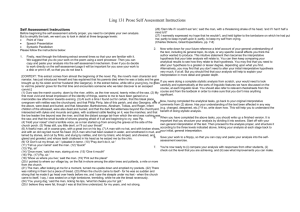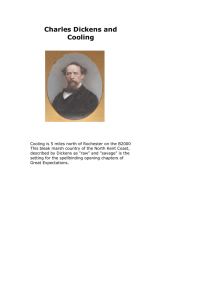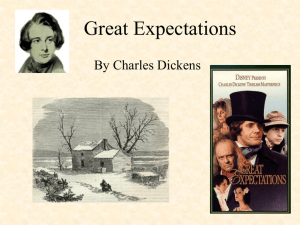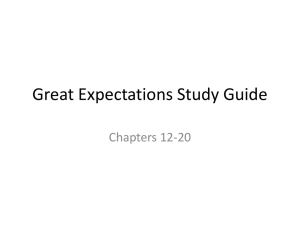Hard Times/Great Expectations
advertisement
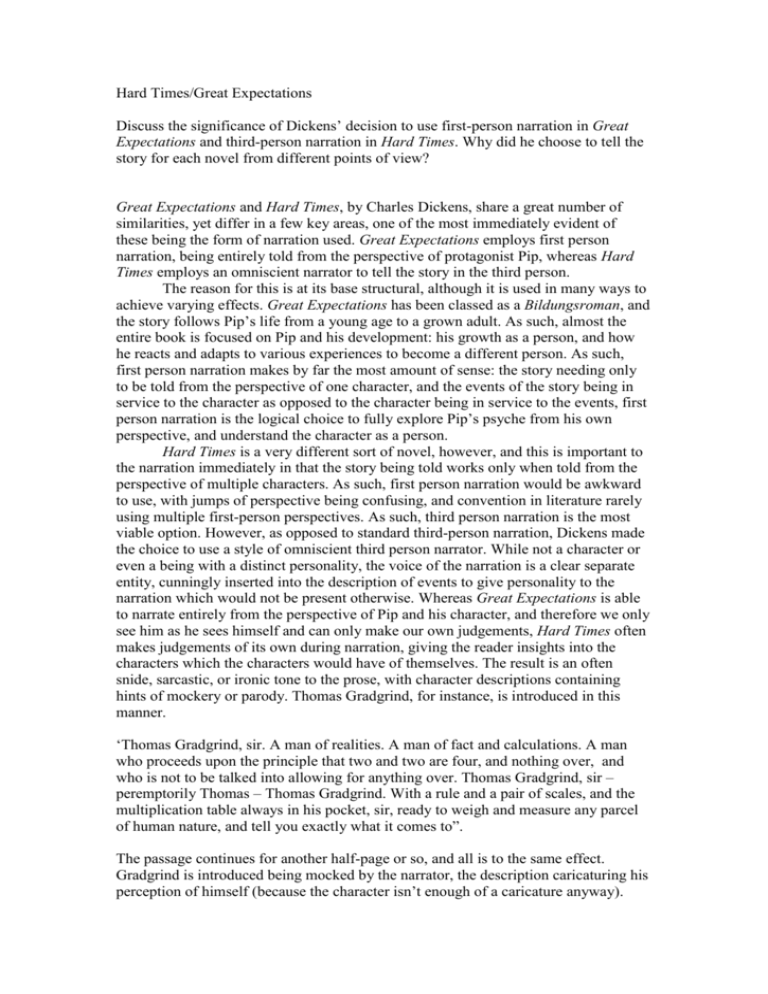
Hard Times/Great Expectations Discuss the significance of Dickens’ decision to use first-person narration in Great Expectations and third-person narration in Hard Times. Why did he choose to tell the story for each novel from different points of view? Great Expectations and Hard Times, by Charles Dickens, share a great number of similarities, yet differ in a few key areas, one of the most immediately evident of these being the form of narration used. Great Expectations employs first person narration, being entirely told from the perspective of protagonist Pip, whereas Hard Times employs an omniscient narrator to tell the story in the third person. The reason for this is at its base structural, although it is used in many ways to achieve varying effects. Great Expectations has been classed as a Bildungsroman, and the story follows Pip’s life from a young age to a grown adult. As such, almost the entire book is focused on Pip and his development: his growth as a person, and how he reacts and adapts to various experiences to become a different person. As such, first person narration makes by far the most amount of sense: the story needing only to be told from the perspective of one character, and the events of the story being in service to the character as opposed to the character being in service to the events, first person narration is the logical choice to fully explore Pip’s psyche from his own perspective, and understand the character as a person. Hard Times is a very different sort of novel, however, and this is important to the narration immediately in that the story being told works only when told from the perspective of multiple characters. As such, first person narration would be awkward to use, with jumps of perspective being confusing, and convention in literature rarely using multiple first-person perspectives. As such, third person narration is the most viable option. However, as opposed to standard third-person narration, Dickens made the choice to use a style of omniscient third person narrator. While not a character or even a being with a distinct personality, the voice of the narration is a clear separate entity, cunningly inserted into the description of events to give personality to the narration which would not be present otherwise. Whereas Great Expectations is able to narrate entirely from the perspective of Pip and his character, and therefore we only see him as he sees himself and can only make our own judgements, Hard Times often makes judgements of its own during narration, giving the reader insights into the characters which the characters would have of themselves. The result is an often snide, sarcastic, or ironic tone to the prose, with character descriptions containing hints of mockery or parody. Thomas Gradgrind, for instance, is introduced in this manner. ‘Thomas Gradgrind, sir. A man of realities. A man of fact and calculations. A man who proceeds upon the principle that two and two are four, and nothing over, and who is not to be talked into allowing for anything over. Thomas Gradgrind, sir – peremptorily Thomas – Thomas Gradgrind. With a rule and a pair of scales, and the multiplication table always in his pocket, sir, ready to weigh and measure any parcel of human nature, and tell you exactly what it comes to”. The passage continues for another half-page or so, and all is to the same effect. Gradgrind is introduced being mocked by the narrator, the description caricaturing his perception of himself (because the character isn’t enough of a caricature anyway). The repetition of ‘sir’ during the passage imitate how Gradgrind might see himself, or expect one to talk to him, immediately giving the reader an insight into what kind of person Gradgrind is before we have even ‘met’ him. Great Expectations is unable to do such, however, as any character introduced is seen as Pip sees him, with all that entails: first impressions, and the consequent process of learning more about the person in question and discovering their personality and character. This can be seen in the instance in which Pip meets Jaggers, the lawyer who brings Pip the news of his benefactor and newly bequeathed wealth. In the first time we properly see Jaggers, before even knowing his name or who he is, he is described as having: “An air of authority not to be disputed, and with a manner expressive of knowing something secret about every one of us that would effectually do for each individual if he chose to disclose it” Immediately afterwards, Pip and his company are said to “quail before him”. Contrasting to the introduction of the somewhat similar character of Gradgrind in Hard Times, which is a removed, parodic account, this description upon having immediately met the man is purely descriptive, befitting the manner in which Pip sees him: with no insight regarding the person, or who he is, yet focused purely on the impression he leaves upon Pip and his company. Indeed, an account even remotely similar to that which the narrator of Hard Times would provide would be impossible, as Pip has no way of knowing anything about the person, and even if he had, he is too much in awe of this domineering figure to dare parody or mock him. Nonetheless, Dickens often desires in Great Expectations to deliver a description of this nature; to reveal to us the ridiculous or caricatured nature of a character whilst leaving Pip none the wiser. In order to achieve this, the novel is forced to rely on events revealing the relevant information about a character: through their speech, we, the reader, despite ‘hearing’ the same words as Pip does, are able, not being as young, to interpret them in a different manner, allowing for example for Pip to be in awe or terrified by a character whilst we are made to laugh at them. Pumblechook, for example, is a figure whom Pip detests, yet who is nonetheless older and in a superior position, and therefore seen by Pip as such. The reader, on the other hand, upon reading how Pumblechook speaks and acts (and being slightly tipped off by the name) are immediately informed on how ridiculous, vain, self-serving and arrogant the character is, whilst Pip is unable to express this or think this of him. (Yes, I know I should have a quote about Pumblechook here demonstrating my point, but I can’t find a good specific one, as Dickens seems to do this over a period of time and several encounters. Sorry ) This is the main point of the varying narrations: essentially, they are different stories and must be told in different ways. The first-person narrative is as vital to explore Pip’s character in GE as the third-person narrative is vital to effectively tell the tales of a large number of major characters in HT.

